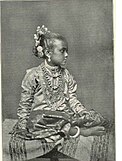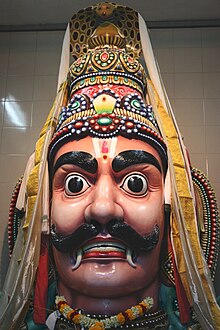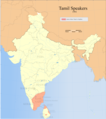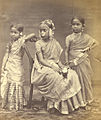Portal:Tamils
The Tamils portal
The Tamils (/ˈtæmɪlz, ˈtɑː-/ TAM-ilz, TAHM-), also known as the Tamilar, are a Dravidian ethnolinguistic group who natively speak the Tamil language and trace their ancestry mainly to India's southern state of Tamil Nadu, to the union territory of Puducherry, and to Sri Lanka. The Tamil language is one of the world's longest-surviving classical languages, with over 2000 years of Tamil literature, including the Sangam poems, which were composed between 300 BCE and 300 CE.
Tamils constitute 5.9% of the population in India (concentrated mainly in Tamil Nadu and Puducherry), 15% in Sri Lanka (excluding Eelam Moors), 7% in Malaysia, and 5% in Singapore. From the 4th century BCE, urbanisation and mercantile activity along the western and eastern coasts of Tamilakam -- what is today Kerala and Tamil Nadu -- led to the development of four large Tamil empires, the Cheras, Cholas, Pandyas, Pallavas, and velirs and a number of smaller states, all of whom were warring amongst themselves for dominance. The Jaffna Kingdom, and vanni chieftaincies inhabited by Eelam Tamils, was once one of the strongest kingdoms of Sri Lanka and controlled much of the north of the island. (Full article...) Selected article -Iravan also known as Iravat and Iravant, is a minor character from the Hindu epic Mahabharata. The son of Pandava prince Arjuna (one of the main heroes of the Mahabharata) and the Naga princess Ulupi, Iravan is the central deity of the cult of Kuttantavar (Kuttandavar) which is also the name commonly given to him in that tradition—and plays a major role in the sect of Draupadi. Both these sects are of Tamil origin, from a region of the country where he is worshipped as a village deity and is known as Aravan. He is also a patron god of well-known transgender communities called Alis (also Aravani in Tamil, and Hijra throughout South Asia). The Mahabharata portrays Iravan as dying a heroic death on the 8th day of the 18-day Kurukshetra War (Mahabharata war), the epic's main subject. However, the South Indian traditions have a supplementary practice of honouring Aravan's self-sacrifice to the goddess Kali to ensure her favour and the victory of the Pandavas in the war. The Kuttantavar tradition focuses on one of the three boons granted to Aravan by the god Krishna in honour of this self-sacrifice. Aravan requested that he be married before his death. Krishna satisfied this boon in his female form, Mohini. In Koovagam, Tamil Nadu, this incident is re-enacted in an 18-day festival, first by a ceremonial marriage of Aravan to Alis (hijra) and male villagers (who have taken vows to Aravan) and then by their widowhood after ritual re-enactment of Aravan's sacrifice. (Full article...)General imagesSelected biography -Navanethem "Navi" Pillay (born 23 September 1941) is a South African jurist who served as the United Nations High Commissioner for Human Rights from 2008 to 2014. A South African of Indian Tamil origin, Pillay was the first non-white woman judge of the High Court of South Africa. She has also served as a judge of the International Criminal Court and President of the International Criminal Tribunal for Rwanda. Her four-year term as High Commissioner for Human Rights began on 1 September 2008 and was extended an additional two years in 2012. In September 2014 Prince Zeid bin Ra'ad succeeded her in her position as High Commissioner for Human Rights. In April 2015, Pillay became the 16th Commissioner of the International Commission Against the Death Penalty. She is also one of the 25 leading figures on the Information and Democracy Commission launched by Reporters Without Borders. Pillay was born and raised in Durban, South Africa where she later attended the University of Natal, receiving her Bachelor of Arts in 1963 and her Bachelor of Law in 1965. After university, Pillay pursued a career as an attorney and served under criminal defense attorney N.T. Naicker, joining the legal defense against apartheid. In 1967, Pillay started her own law firm and became the first woman to do so in her home province of Natal. In 1981, Pillay applied to and attended Harvard University under the foreign exchange Harvard-South Africa Scholarship Program and earned her Master of Law. In 1988, she completed her thesis and graduated from Harvard Law School with a Doctorate of Jurisprudence. (Full article...)CategoriesTopicsTamil People Countrywide: India • Sri Lanka • Canada • Malaysia • Singapore • South Africa • England Related Ethnic Groups: Brahui • Gond • Kannadiga • Khonds • Kodava • Oraon • Malayali • Telugus • Tuluvas Related indigenous Groups: Badagas • Toda • Kuruba
See also: List of Tamil people, Tamil script, Tamil Script Code for Information Interchange Related portalsWikiProjectsThings to do
Associated WikimediaThe following Wikimedia Foundation sister projects provide more on this subject:
Discover Wikipedia using portals |
































































